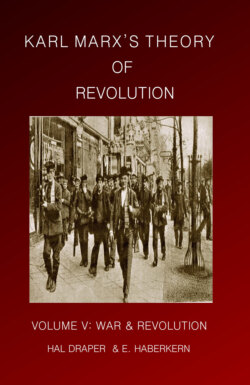Читать книгу Karl Marx’s Theory of Revolution Vol V - Hal Draper - Страница 15
На сайте Литреса книга снята с продажи.
2. The Main Enemy
ОглавлениеThis is the background which explains the contradictory combination (so it seems to us) that characterized the foreign policy of the newspaper edited by Marx in Cologne, the Neue Rheinische Zeitung (NRZ). On the one hand, there were the patriotic calls for a war against Russia in the interest of a united Germany and, on the other, a steady stream of articles which could be summarized under the head—“the main enemy is at home.”
In Engels’ case this identification of patriotism and hostility to the existing authorities predated his association with Marx or his interest in socialism. Writing as a “Young German,”3 in 1841 he took for his target the apologists for German backwardness. Perhaps the best example of Engels Young German period, this article, titled “The ‘War of Liberation’ Against Napoleon,” was an attack on the hysterical Francophobia of the “Franzözenfresser”*—the defenders of Christian-German reaction. No, says Engels, the French are a model for us Germans; they represent “civilization.” The enemy is the alliance of England and Russia. Later, the post-Marx Engels would be more specific. He would identify “civilization” with the bourgeoisification of Germany (and other backward countries) and explain why England and Russia, for different reasons feared the spread of the bourgeois order in Europe.** In this early article Engels is expressing the “left” nationalism that was common to all the young radicals who felt ashamed of the backwardness of their country. His was the defensive nationalism of the citizen of a fragmented country.
Writing in this context Engels gives his own twist to the German nationalist glorification of the “War of Liberation” against Napoleon. Like most Rhinelanders—not just radicals—Engels tended to look on the French occupation favorably because of its “civilizing”4 effect. The subsequent occupation of the Rhineland by backward, feudal-absolutist, bureaucratic, Prussia reversed the gains that had been made under Napoleon. As a Young German Engels was torn between admiration for the rebellion against Napoleon and skepticism as to its results:
. . . the greatest result of the struggle was not the shaking off of foreign rule [which would have crashed anyway] . . . , it was the deed itself . . . That we became conscious of the loss of our national sanctuaries, that we armed ourselves without waiting for the most gracious permission of the sovereigns, that we actually compelled those in power to take their place at our head, in short, that for a moment we acted as the source of state power, as a sovereign nation, that was the greatest gain of those years . . .”5
Engels was to comment later, on a number of occasions, on the halfheartedness of this imitation of 1793. In fact, his estimation of the national movement of the Germans, as of the French and other nationalities, varied over time depending on political circumstances. What was to remain constant was his emphasis on rebellion against the existing authorities as the real measure of a nation’s greatness and viability.
